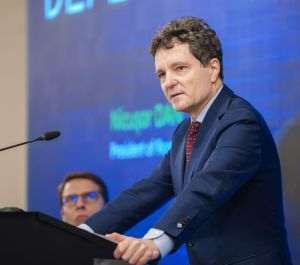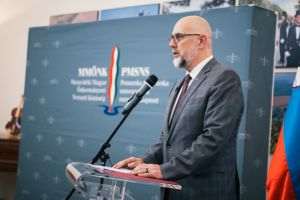• Florin Cîţu: The deficit hides any public debt and rising expenditures, and there is no fiscal consolidation in sight
Romania is far more prepared than it was in the past to handle next year's "financial storm" PM Emil Boc said. He justified the statement made yesterday, in an economic forum, by saying that this year is expected to end with an economic growth of 1.5-2% (after four quarters of economic growth), with a deficit of 4.4% (the goal for next year is for the deficit to fall to 1.9%, and the deficit target for 2013 has been set at 0%) and with a "public debt level of 32-33%, as the maximum level allowed in the EU is 60%".
However, economists feel different. Analyst Florin Cîţu said that Romania's goal is not to have a low deficit, but rather to lower expenses, which are actually rising continuously: "Public spending will increase in 2012 and in 2013, just as they did in 2011. Both cash expenses and those included in the consolidated budget have increased, and the gap between them is also rising. The deficit hides a growing public and rising government spending, which we do not see. Wage expenses have become greater than in 2008. There is no fiscal consolidation, the deficit can also be played using revenues. As for the public debt, which currently stands at 34%, it has increased from 16%, in 2008 and will also see an upward trend, as estimated by the IMF".
Emil Boc emphasized the fact that in 2012 the flat tax rate of 16% will be kept, as well as the basic taxes like social security contributions and the VAT.
He made these statements while addressing foreign investors who attended a forum on private public partnerships.
"There are already investors from Korea and the Gulf who are interested in the projects of our country", the PM said, and he stressed once again that Romania is outside any risk scenario, as it is increasingly competitive.
Public private partnerships (PPP) are one of the growth engines of the Romanian economy, in the opinion of the Prime Minister. According to him, two more factors that will help the economy grow are the investments which the government will make, by allocating a budget for that purpose, which will be bigger by 500 million Euros next year compared to 2011, and the absorption of European funds, of which the authorities plan to spend 6 billion Euros next year.
The PM stressed that county and local projects are extremely important when it comes to the PPP projects. The government has drafted a list of 20 projects which would be developed using the PPP system, with a total value of tens of billions of Euros.
The most important sectors where such projects have begun include energy (with the Tarniţa-Lăpuşteşti plant, reactors 3 and 4 of Cernavodă and the AGRI interconnector, as the main investments), infrastructure (which involves the construction of the Sibiu-Piteşti, Comarnic-Braşov, Târgu Mureş-Iaşi- Ungheni, highways, as well as the Transylvanian highway), agriculture (the Siret-Bărăgan canal which is viewed as a project which could be developed in a PPP system), healthcare (the regional emergency hospitals which will be built).
PM Boc said that the Executive will do everything in its power to complete the privatization process in the tourism sector, adding that the Danube-Bucharest canal will also be developed in the PPP system : "We are near the zero hour. We have the law, the European regulations, all we need is the impulse for starting projects using a public private partnership. And I hereby agree that here, a very important part is played by the government. The head of the government emphasized the idea that Romania offers a predictable and stable environment for investors.
The Romanian banking system has the ability to finance simple as well as major projects, according to Radu Graţian Gheţea, the president of the Romanian Banking Association (ARB): "Every time a new project appears and auctions are held, a series of banks register and submit tenders for those projects".
Mr. Gheţea expressed his confidence in the financing of public private partnerships, saying that they need to be approached with extreme seriousness: "Our mission (ed. note: CEC Bank) for next year, will change a little, at least in 2012. Whereas until now we were focused on financing agriculture, SMEs and the projects of the local public administrations, next year we will add financing of PPPs to our list of goals".
•
The Ministry of Regional Development and Tourism (MDRT) launched a list of priority projects which need to be accomplished in a public-private partnership system, with their total value exceeding two billion Euros, as stated by Razvan Murgeanu, secretary of state in the MDRT.
He said that most of these things concern the creation of a Multifunctional Polyvalent Hall (worth 60 million Euros), of the country's cadastre, the bridge over the Danube, in association with the authorities of Brăila and Tulcea (an investment of 120 million Euros), of the Alexeni Airport, as well the development of the spa resorts.

























































